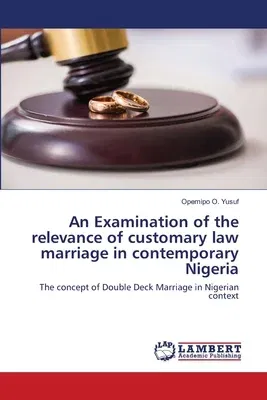Opemipo O Yusuf
(Author)An Examination of the relevance of customary law marriage in contemporary NigeriaPaperback, 8 June 2020

Qty
1
Turbo
Ships in 2 - 3 days
In Stock
Free Delivery
Cash on Delivery
15 Days
Free Returns
Secure Checkout
Print Length
80 pages
Language
English
Publisher
LAP Lambert Academic Publishing
Date Published
8 Jun 2020
ISBN-10
6202667427
ISBN-13
9786202667425
Description
Product Details
Author:
Book Format:
Paperback
Country of Origin:
US
Date Published:
8 June 2020
Dimensions:
22.86 x
15.24 x
0.48 cm
ISBN-10:
6202667427
ISBN-13:
9786202667425
Language:
English
Pages:
80
Publisher:
Weight:
127.01 gm

